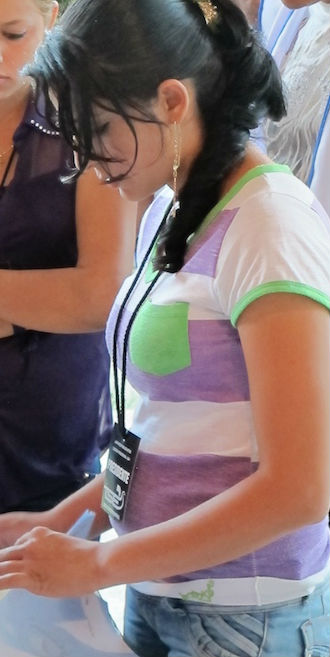El Salvador: A new democratic norm?
 On February 2, the people of El Salvador went to voting centers to elect the country's fifth post-war president. Photo: Vic Hinterlang
On February 2, the people of El Salvador went to voting centers to elect the country's fifth post-war president. Photo: Vic Hinterlang
A fair post-war election sets the stage for the next high-stakes decisions ahead.
Adam Olson, Oxfam’s Chicago-based Regional Advocacy Lead, served as an international election observer with US-El Salvador Sister Cities earlier this month.
A second-round presidential election will be held in El Salvador on March 9th. As the people of El Salvador went to voting centers on February 2nd to elect the country’s fifth post-war president, I was there, grateful to watch history happen as an international election observer, working in solidarity with Salvadorans on this historic day. Though no presidential candidate won a majority of votes, the day was a clear victory for civil society in the country’s democratic evolution. It’s needed for crucial decisions ahead.
Even this gringo could sense the anticipation and guarded anxiety surrounding the election upon arriving a week in advance. Concern of unrest was so serious that, to reduce compounding factors, the alcohol sales were suspended from two days before through the day after voting. The Salvadorans I met, all welcoming without exception, made it clear that the shadow of history was inescapable this election day.
The violent civil war (1980-1992) is within living memory of many Salvadorans. Contending political parties trace their lineage to wartime adversaries, and previous post-war presidential elections were wrought with irregularities. Recent elections elsewhere in the region experienced significant problems.

February 2 in El Salvador was different. Despite the history, elections were free and fair. International election observers, from organizations like US-El Salvador Sisters Cities, the US National Lawyers Guild, and SHARE El Salvador, played a solidarity and monitoring role. Aside from trouble with diaspora absentee voting, most election-day challenges noted by observers were similar to those experienced by mature democracies. In fact, voting in the town of Cinquera, where I was posted, went smoother than any election I assisted with as an election monitor in Minneapolis.
The participation of young Salvadorans in campaigning and actual election administration was inspiring. In Cinquera, nearly all vote receiving board officials were in their 20s. Civil society organizations contributed to voter education without fear of repression. Voter turnout was high, and the country held its first televised presidential debate – lofty pledges, evasive answers, and all.
In addition to a generally well-executed election, I witnessed solemn excitement from voters at the polls and a powerful sense of community. Election day being a Sunday, instead of a weekday, helped foster this. Voters lingered to speak with their neighbors while their kids played. I heard no cynical complaints of a lack of “real choice,” which is often heard in the United States, as Salvadorans understood the candidates offered contrasting visions for the country. A prevailing sense of nervousness gave way to confidence as the day progressed, despite the occasional mistake and disagreement.
Salvadorans in my group agreed: The tone and execution was a hopeful departure from previous elections. There are improvements to be made, however should the second round vote be similar, it will seem that El Salvador has arrived at a new democratic norm.
This bodes well for the country’s ongoing struggle against poverty and inequality. El Salvador faces critical policy decisions in social services, agriculture, security, foreign relations, the environment, and more. As my colleague Juliana Turqui recently wrote, the ongoing debate on metallic mining has intensified ahead of the runoff vote.
I met many Salvadorans ready to improve their lives with a fair say, an equal shot, and a stable political environment. An empowered civil society that can elevate the voices of El Salvador’s most vulnerable communities during legitimate elections will help ensure the country is having the right debates, on and off camera.
As my voting center closed, fireworks erupted outside. Since war had destroyed this village before, the sound of explosions triggered a reaction of concern from some inside the voting center until cheers followed from the street.
My fellow election observers emerged from the voting center about two hours after voting ended to find an impromptu party on the street. Perhaps over one hundred people of all ages awaited election results. Children asked us to take their picture. Grandmotherly food vendors made the most of the opportunity. Part of the joy came from the relief of a peaceful election day.
An echo from the past had given way to celebration.
***
Oxfam is helping to highlight the high stakes through partnerships, a series of videos (including this one), and a broader effort called #PiensayDecide (think and decide).